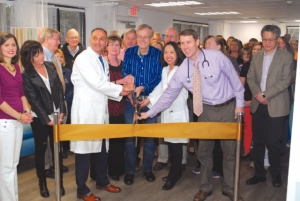Southeastern Medical Oncology Center expands
By From staff reports
Published in News on February 8, 2017 10:07 AM

Submitted photo
Southeastern Medical Oncology Center celebrated the opening of its new cancer patient expansion recently. Cutting the ribbon, from left, are Sherry Atkins, Lorice Kasbari, Dr. Samer Kasbari, Dr. James Atkins, Dr. I-Wen Chang, Dr. Jason Boyd and Dr. Oliver Tu.
Southeastern Medical Oncology Center is able to serve more clients with the recent expansion of its chemotherapy department.
SMOC, located at 203 Cox Blvd., has added an infusion area for non-chemotherapy clients. The new area was added into previously used office space. The expansion also includes a new waiting area alongside the treatment rooms.
"Having more room allows the patient to access treatment sooner," said Dr. I-Wen Chang, oncologist and SMOC partner. "Sometimes in the past, they have waited a half hour to 45 minutes for a (treatment) chair.
"I think its mainly for the comfort of patients and their families so that people don't have to wait to get the services that they need."
The addition of a non-chemotherapy infusion room allows the separation of chemotherapy patients from non-chemotherapy patients. In the past, all were treated in the same area, said Stacey Casey, chemotherapy supervisor.
"Because our chemotherapy patients often deal with a decreased immune system, being able to separate the two infusion areas better protects the patients. It also allows us to better serve our community."
The chemotherapy department had one bed and 15 chairs, but was able to increase to 16 chairs with the new expansion. The new infusion area has six chairs. The capacity increase overall is the addition of seven new chairs.
"In this facility, we average about 55 patients a day, and now we could average up to about 70."
The new infusion area gives Southeastern Medical Oncology Center the capability to administer all non-chemotherapy treatments that can include; intravenous antibiotics, iron, rheumatology infusions, hydration, certain injections such as vitamin B12 and vaccines, Casey said.
Chang said the expansion also helps keep down the cost of medical care by offering treatments that can prevent the need for hospital-based care.
"That's why we want to expand," Chang said. "We can give them fluids here, instead of having them go to the ER or being admitted. We're saving people money."
